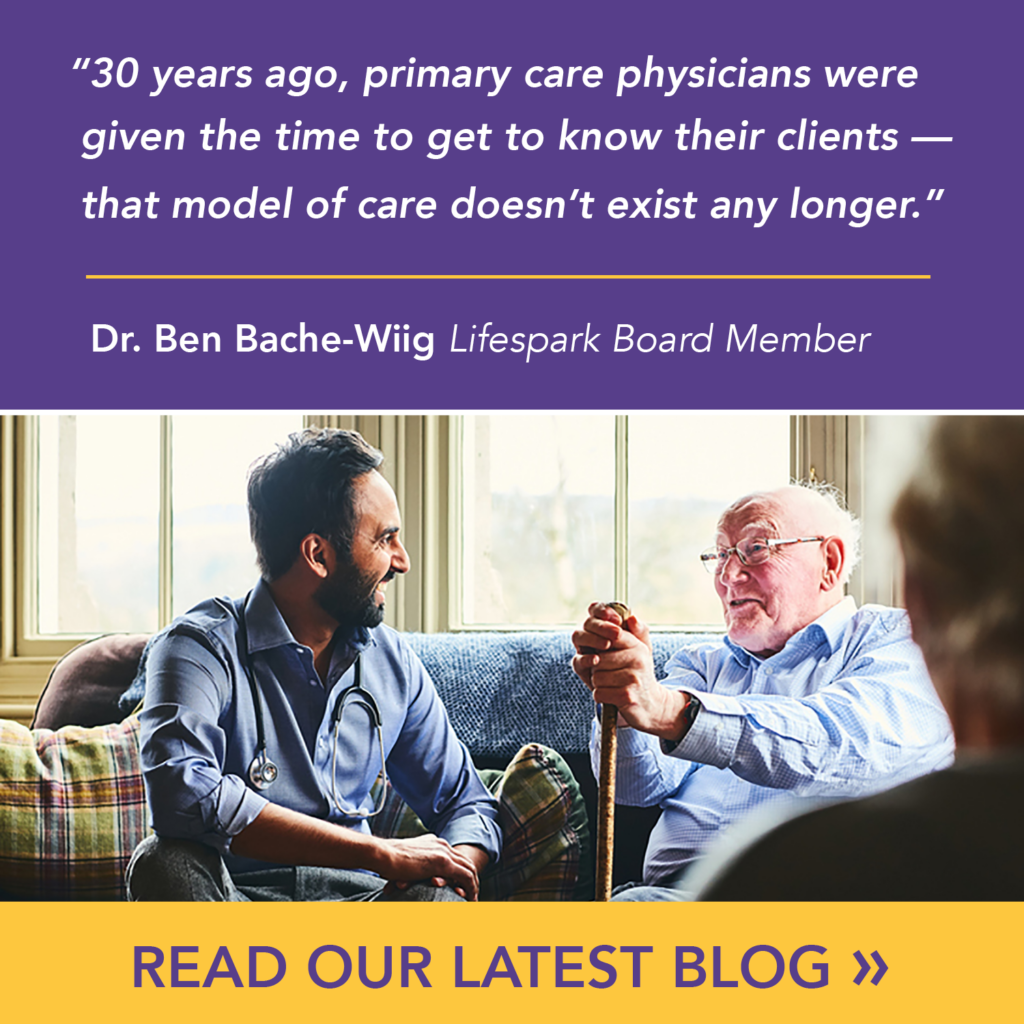
When Dr. Ben Bache-Wiig, MD, Lifespark’s Executive Medical Director, began practicing internal medicine some 30 years ago, primary care physicians were given the time to get to know their clients, build long-term, trusted relationships with them, and follow them from clinic to hospital to rehab—wherever their care took them. “That model of care doesn’t exist any longer,” Dr. Bache-Wiig said. “Instead, we have a fragmented, a la carte services model that’s especially challenging for people who need ongoing care.”
In addition, large swaths of the current system operate on autopilot, propelled by a self-sustaining momentum. “The fee-for-service model is perfectly designed to deliver copious amounts of low-value care, not because it delivers value, but because it’s profitable,” Dr. Bache-Wiig said. “It’s all green lights until someone applies the brakes and questions the purpose of a particular treatment or medication.”
Download our eBook NOW: Helping Your Parents Win the Independence Game
Stranger danger
Increased fragmentation has led to another challenge: the challenge of not being known. “The health care system can feel very anonymous, with the most important care being delivered by strangers,” Dr. Bache-Wiig said. “If you’re hospitalized for an acute event, you’re seen by a hospitalist who may have excellent training and the best of intentions but doesn’t know you from any of the other 15 people they’ll see that day.” What gets lost is the complete picture of the individual—not just their medical profile, but also their life goals and preferences which should play a central role in determining treatment.
In addition, if the individual needs care after hospitalization, or has ongoing medical needs, it can be extremely frustrating trying to get the doctors and specialists to communicate with each other and with the client. Unless they have someone to advocate for them and support their recovery, these individuals are at high risk for relapse and rapid decline.
A vision of better
It was Lifespark’s vision for how to prevent this downward spiral that intrigued Dr. Bache-Wiig. He joined Lifespark in 2019 to help the organization develop its model of value-based care to better serve seniors. Called Lifespark COMPLETETM, this model of comprehensive, coordinated care is available through select Medicare Advantage plans to clients who meet certain criteria.
Lifespark COMPLETE members work with a Life Manager, as their single point of contact, and a Lifespark geriatric medicine (a.k.a., senior savvy) expert. Together, they define what kind of care the senior wants and doesn’t want. Then, if the member lands in the ER or hospital, Lifespark’s Transitions Management team will step in to make sure their goals of care are known.
The Transitions team will also create a comprehensive discharge plan to help the client get the support they need when they’re most vulnerable, so they can stay on the road to recovery. Discharge plans include more frequent visits from the Life Manager, a thorough medication review by Nurse Practitioner, and to help take pressure off family members, coordination of community resources, such as transportation, shopping, meals, and other tasks.
Extras beyond benefits
Finding out which plans offer access to Lifespark COMPLETE can take a bit of effort, but it’s an investment in your future, Dr. Bache-Wiig said. Having recently joined the ranks of Medicare recipients, he understands how confusing it can be to choose a Medicare plan. “They all look pretty good on paper, so the key is to look for the extras you might need in the future,” he said. One of the most important extras, particularly for people with ongoing medical needs, is coordination of care. It’s the difference between a Medicare Advantage plan with a Lifespark option and one without.
“We know we can’t completely prevent the challenges that can happen as people age, but with the right support, we can assure the best opportunity for aging magnificently,” Dr. Bache-Wiig said.
For guidance on finding a health plan that offers the most important extras, download our free eBook:


